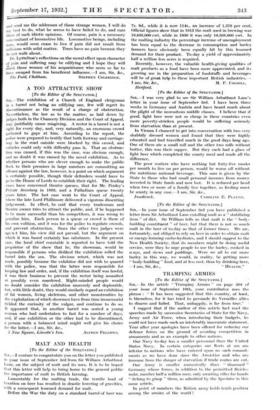A TOO ATTRACTIVE SHOW
[To the Editor of the SPECTATOR.] SIR,—The exhibition of a Church of England clergyman in a barrel not being an edifying one, few will regret its discontinuance as the result of a charge • of obstruction. Nevertheless, the law as to the matter, as laid down by judges both in the Chancery Division and the Court of Appeal, may justifiably cause misgiving. A rector in a barrel is not a sight for every day, and, very naturally, an enormous crowd gathered to gape at him. According to the report, the police were prepared to testify that both footway and carriage- way in the road outside were blocked by this crowd, and vehicles could only with difficulty pass it. That an obstruc- tion was caused, if this was the case, was obvious enough, and no doubt it was caused by the novel exhibition. As to whether persons who are clever enough to make the public flock to their premises in large numbers are committing an offence against the law, however, is a point on which argument is certainly possible, though their defenders would have to go to the House of Lords to establish their right. The leading cases have concerned theatre queues, that for Mr. Penley's Private Secretary in 1893, and a Palladium queue twenty years later. The last case went to the Court of Appeal, where the late Lord Phillimore delivered a vigorous dissenting judgement. In effect, he said that every tradesman and theatre owner tries to attract the public, and, if he happened to be more successful than his competitors, it was wrong to penalize him. Each person in a queue or crowd is there of his own volition, and it was for the police to regulate crowds, and prevent obstruction. Since the other two judges were aga'n ,t him, his view did not prevail, but the argument on which it was based certainly has substance. In the present case, the local chief constable is reported to have told the proprietor of the show that he, the showman, would be responsible if persons who disliked the exhibition rolled the barrel into the sea. The obvious retort, which was not made, possibly because the exhibitor did not wish to quarrel with the police, was that the latter were responsible for keeping law and order, and, if the exhibition itself was lawful, it was their business to prevent the rector being assaulted or possibly even murdered. Right-minded people would no doubt consider the exhibition unseemly and deplorable, but, with little doubt, they would similarly regard an exhibition of fat women, living skeletons, and other monstrosities by the exploitation of which showmen have from time immemorial tickled the curiosity of the vulgar, and continue to do so: It appeared that, in another barrel was seated a young woman who had undertaken to fast for a number of days, and, if one exhibition or the other had to be discontinued, a person with a balanced mind might well give his choice for the latter.—I am, Sir, &c., •






























 Previous page
Previous page